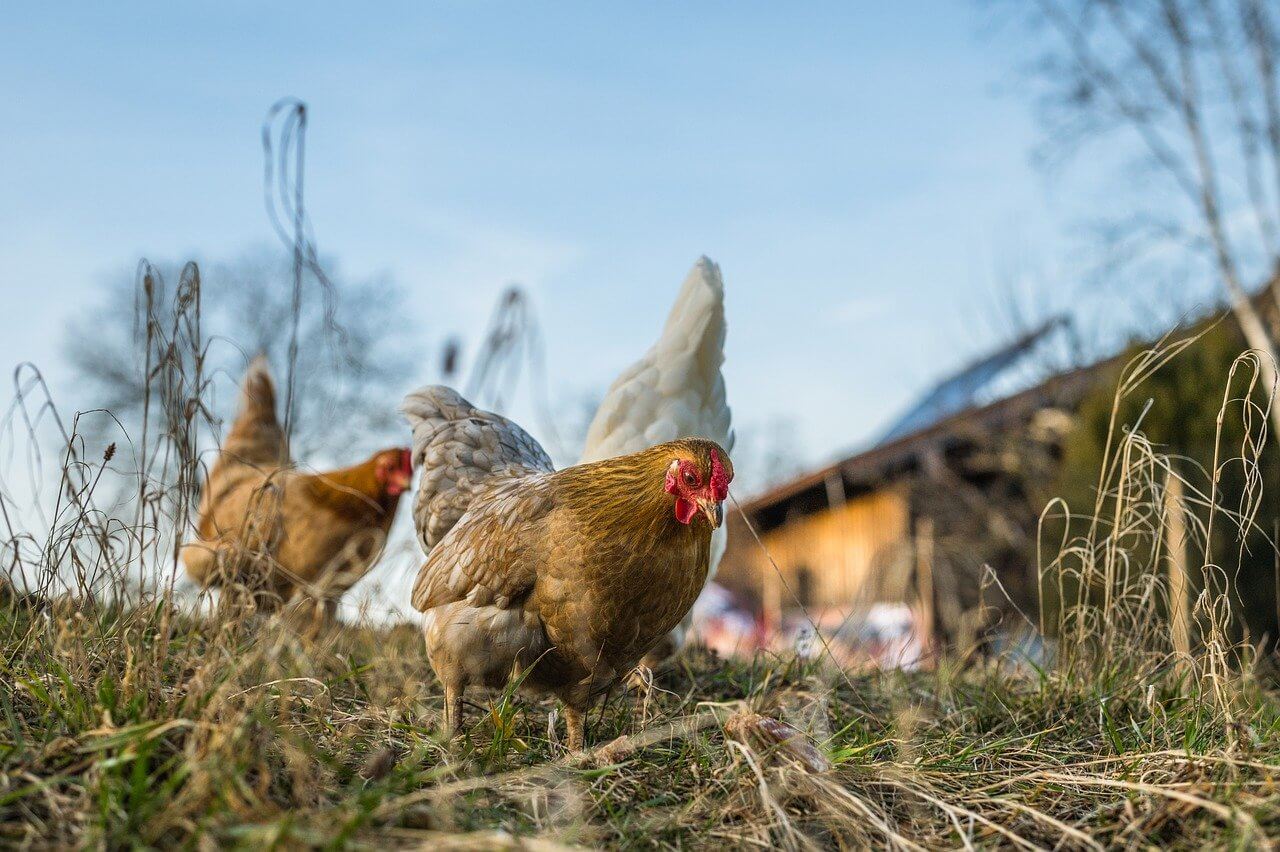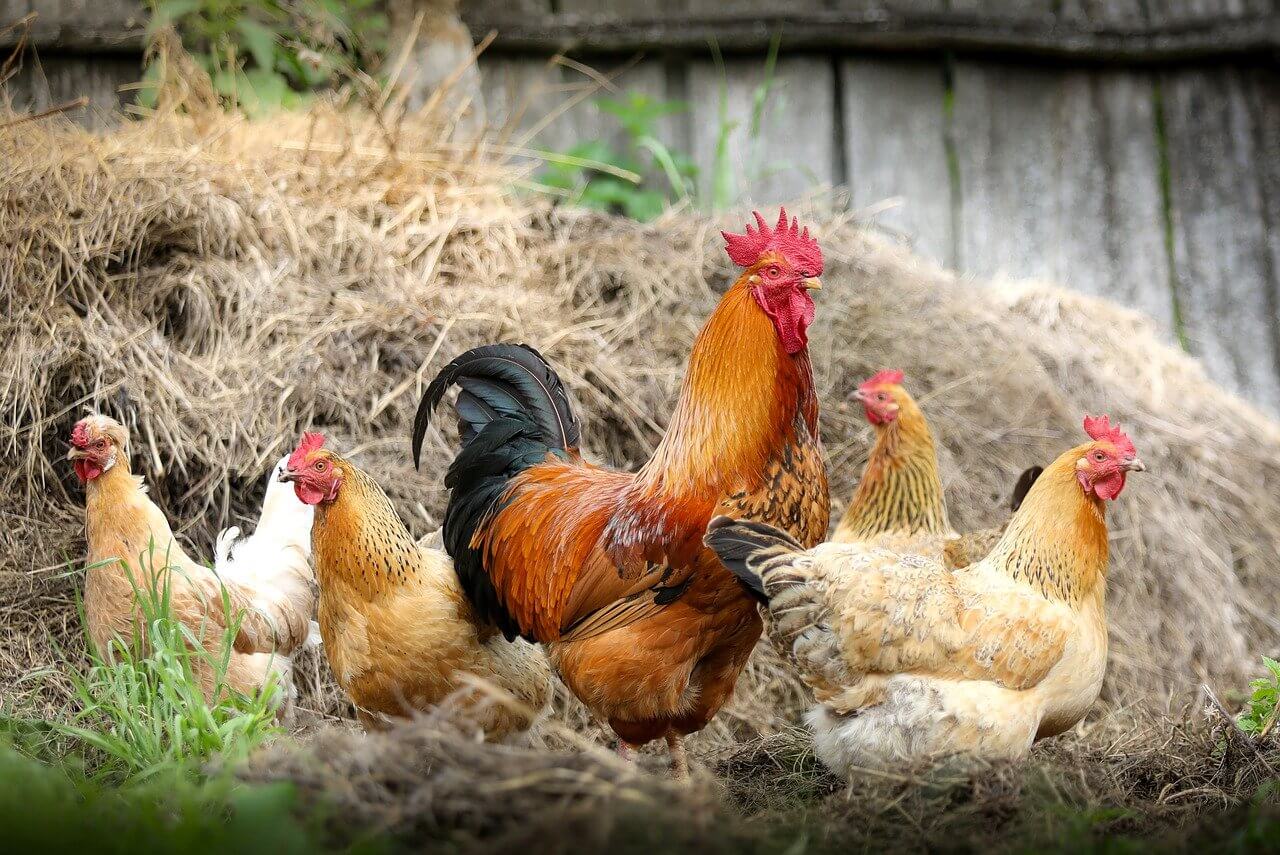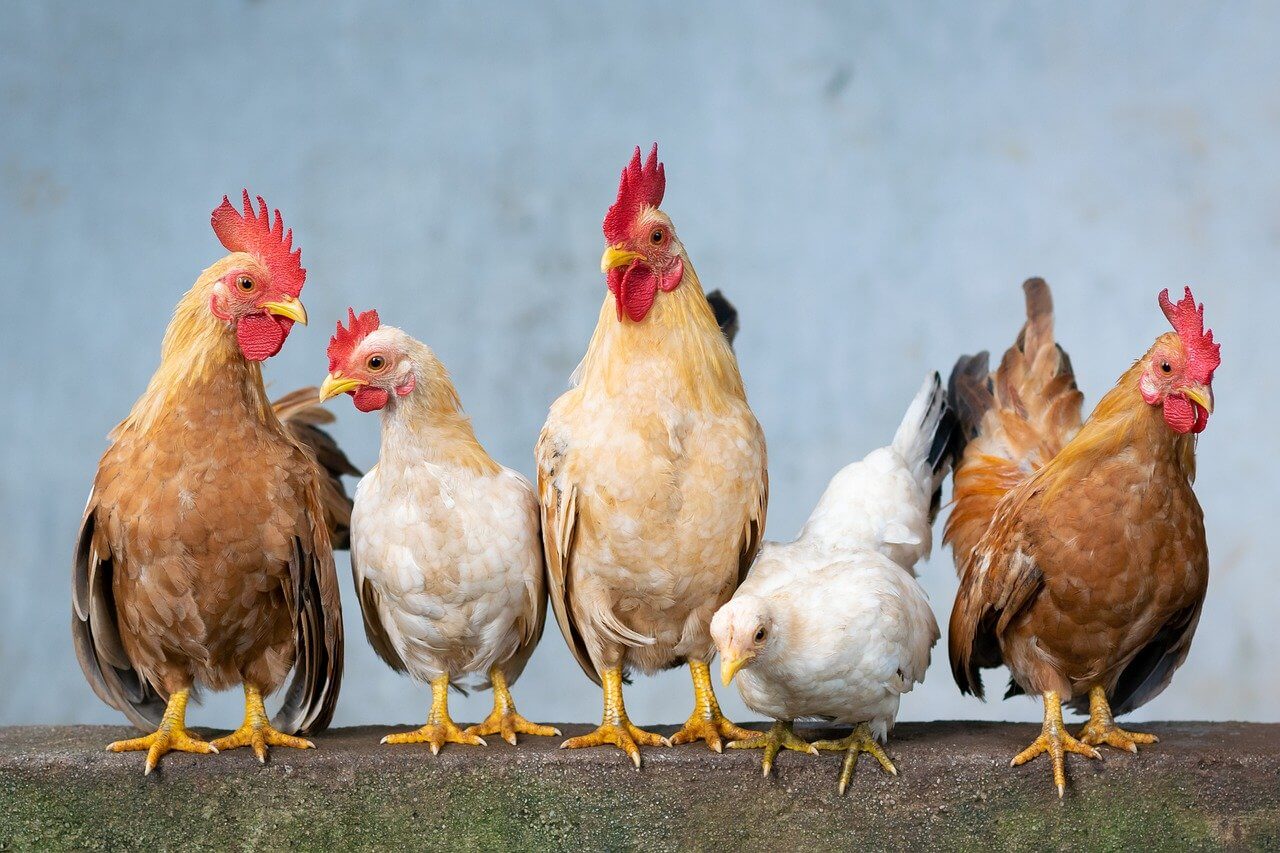Chickens are omnivores and enjoy a wide variety of foods, including vegetables, fruits, insects, and meat. There are, however, things that can be bad for your birds and may even kill them. In this article, we’re going to be asking what can chickens eat and providing you with some valuable lists for guidance.
What You'll Learn Today
- What Can Chickens Eat? List
- Almonds
- Apples
- Asparagus
- Bananas
- Beans
- Bell Peppers
- Blueberries
- Bread
- Broccoli
- Brussels Sprouts
- Cabbage
- Cantaloupe
- Carrots
- Cat Food
- Cauliflower
- Celery
- Cereal
- Cheese
- Cherries
- Chia Seeds
- Chicken
- Citrus
- Corn
- Crickets
- Cucumbers
- Dog Food
- Eggs
- Fish
- Flowers
- Fruit
- Garlic
- Grapefruit
- Grapes
- Grass
- Green Beans
- Ham
- Kale
- Kiwi
- Lettuce
- Mango
- Mealworms
- Meat
- Melon
- Nuts
- Oatmeal
- Oats
- Oranges
- Pasta
- Peaches
- Pears
- Peas
- Pecans
- Peppers
- Pineapple
- Plums
- Pomegranate
- Popcorn
- Potatoes
- Pumpkin
- Quinoa
- Radishes
- Rice
- Squash
- Strawberries
- Sunflower Seeds
- Sweet Potatoes
- Tomatoes
- Walnuts
- Watermelon
- Yogurt
- Zucchini
- What Can Chickens Not Eat? List
- What Foods Are Poisonous To Chickens
- Can Chickens Eat Raw Vegetables?
- What is a Chicken’s Favorite Food
- Conclusion
What Can Chickens Eat? List

Chickens can eat and enjoy many of the same foods that we do. These include:
Almonds
Chopped unsalted almonds, ground, or almond flour.
Apples
Deseeded apples, apple sauce, windfall apples. High in sugar.
Asparagus
High in vitamins, minerals, and dietary fiber, but many chickens won’t eat it, and it may taint the taste of the eggs.
Bananas
High in vitamins B6, C & A and contain niacin, iron, magnesium, and other trace elements. They tend not to enjoy eating Banana peel.
Beans
ONLY cooked beans, raw or dried beans, are toxic.
Bell Peppers
Fruit only, as the rest of the plant contains solanine and is toxic.
Blueberries
High in antioxidants, vitamins, and minerals. Turns poop blue!
Bread
Fed in moderation. Although chickens enjoy eating it, it is typically low in nutrients.
Broccoli
All brassica family veggies (Broccoli, brussels sprouts, cabbage, cauliflower, kale, turnips) should be fed in moderation. They contain goitrogens that can cause thyroid gland issues in birds as well as immune, reproductive, metabolic, skin, and feather problems. It is, however, high in various minerals and vitamins. Birds usually prefer it cooked.
Brussels Sprouts
All brassica family veggies (Broccoli, brussels sprouts, cabbage, cauliflower, kale, turnips) should be fed in moderation. They contain goitrogens that can cause thyroid gland issues in birds as well as immune, reproductive, metabolic, skin, and feather problems. It is, however, high in various minerals and vitamins. Birds usually prefer it cooked.
Cabbage
Packed full of trace minerals and vitamins. It is a member of the brassica family of veggies (Broccoli, brussels sprouts, cabbage, cauliflower, kale, turnips). It should be fed in moderation, as it contains goitrogens that can cause thyroid gland issues in birds as well as immune, reproductive, metabolic, skin, and feather problems. It is, however, high in various minerals and vitamins. Birds usually prefer it cooked.
Cantaloupe
High in vitamins A & C and the B’s, but should be fed in moderation as it may cause diarrhea in some birds. The seeds are also edible and healthy for chickens.
Carrots
Raw or cooked, carrots are full of vitamins and minerals. The green tops can be eaten too.
Cat Food
It is very rich and can cause upset if too much is given. Both dry and wet cat food can be fed in minimal amounts. Can sometimes be useful for sick chickens.
Cauliflower
Like the other brassica family of veggies (Broccoli, brussels sprouts, cabbage, cauliflower, kale, turnips), it should only feed in moderation. It contains goitrogens that can cause thyroid gland issues in birds as well as immune, reproductive, metabolic, skin, and feather problems. Contains healthy minerals and vitamins.
Celery
A good source of vitamins B2, B6, C & K. Also contains trace minerals potassium, fiber, and calcium. Many birds don’t like it.
Cereal
Breakfast-type cereal contains a lot of added sugars, so only give in very small quantities infrequently.
Cheese
Like humans, chickens can’t process dairy very well. It is a good source of protein and calcium that may be given in moderation.
Cherries
Cherries are filled with vitamin goodness with A, C, E & K, plus minerals. Another valuable component is choline, essential for chicken health.
Chia Seeds
Very nutritious, they form a gel in the gut, which can act as a soothing coating. Feed it mixed with other seeds or as part of a scratch grain.
Chicken
As dreadful as it sounds, Chickens will eat chicken. They are opportunists by nature, and it is an excellent source of protein. Give your hens your chicken carcass to pick clean. As the skin is very high in fat, it is best removed.
Citrus
Most chickens won’t eat citrus. It is very healthy, but may taint the taste of eggs.
Corn
All types of corn on the cob, fresh, canned, or frozen, can be given. Useful in winter to maintain weight and body temperature in cold weather.
Crickets
These are high in protein minerals and trace elements. Enjoyed as a snack.
Cucumbers
Useful on hot days to supplement water intake. Full of vitamins and minerals and have anti-inflammatory properties.
Dog Food
Only feed in extreme moderation. Like cat food, it is very rich but can be helpful for a sick hen.
Eggs
They love eggs. Make sure they can’t recognize an egg, or they might start eating their own. Better if you cook it first and feed it scrambled. It can be helpful to feed to chicks.
Fish
Raw or cooked. Chickens also like eating the guts. High in protein and minerals.
Flowers
Some, but not all flowers are safe for chickens to eat. Normally, they seem to know which plants are toxic, but it’s always best to check!
Fruit
Fruit can be fed in moderation as it is generally high in sugar.
Garlic
It can be very beneficial to chickens when given in feed or water providing it is done in moderation. Excess garlic can cause an imbalance in good gut bacteria.
Grapefruit
Citrus fruit is beneficial in moderate amounts. Most chickens don’t like it, however.
Grapes
These are high in vitamins A & C and B and trace elements including calcium and copper. They have a very high sugar content so feed sparingly.
Grass
Grass clippings free from chemicals are good for chickens. Avoid giving long grass strands as they can cause an impacted crop.
Green Beans
Cooked beans are OK to feed. As few as 3 raw, dried, or undercooked beans can be deadly as they contain phytohemagglutinin.
Ham
This is generally high in salt and preservatives, so it should be fed very sparingly.
Kale
As with other brassicas (Broccoli, brussels sprouts, cabbage, cauliflower, kale, turnips), only feed in moderation, as it contains goitrogens that can cause thyroid gland issues in birds as well as immune, reproductive, metabolic, skin, and feather problems. Contains healthy minerals and vitamins.
Kiwi
Contains vitamins, minerals, and antioxidants but is high in sugar.
Lettuce
Has relatively low nutritional value (iceberg lettuce has none at all), so only give as an occasional treat. Whole lettuce can be hung for chickens to peck at for entertainment.
Mango
It is very nutritious but also high in sugars and carbohydrates. Feed sparingly.
Mealworms
Very high in protein, and are great to give as an occasional healthy treat, especially when chickens are going through a molt. Feed either fresh or dried.
Meat
Some people believe giving chickens raw meat may turn them to cannibalism. If you feed it, trim off any excess fat first. They like to strip your cooked turkey or chicken carcasses.
Melon
Fed in moderation as high in sugar, they enjoy the flesh and seeds.
Nuts
High in good omega 3 fats. It should be chopped first. Never feed moldy nuts
Oatmeal
As a winter warmer, oatmeal is good mixed with birdseed for an occasional treat.
Oats
Raw or cooked oats contain vitamins and minerals and also some protein.
Oranges
Although they are acceptable to feed, most chickens don’t like citrus fruits.
Pasta
Very high in carbohydrates and of little nutritional value, so only give sparingly.
Peaches
Peaches with the pits removed are nutritious treats with vitamins, fiber, and minerals.
Pears
Lower in sugar than many other fruits, it makes a good snack for your birds. Not all chickens seem to like them.
Peas
High in protein, suitable for feeding during molt.
Pecans
Chop to aid digestion.
Peppers
Although bell pepper fruits can be fed to chickens, all other parts of the plant are toxic as it contains Solanine. Most chickens won’t eat peppers.
Pineapple
High in vitamins and minerals, pineapple is also high in sugar. It is not favored by most chickens. Can cause fiber balls to build up in the crop.
Plums
Remove pits first as they contain minute amounts of cyanide. High in sugar, feed sparingly.
Pomegranate
Low in sugar, high in vitamins, minerals, and fiber. A healthy snack for your chickens.
Popcorn
Contains vitamins A, E & K, plus minerals and fiber. Don’t feed salted, sweetened or flavored popcorn.
Potatoes
Cooked potatoes can be given to chickens. Don’t feed any part of a green potato as this contains the poison Solanine. The plant itself is toxic as it is a member of the nightshade family.
Pumpkin
The flush contains vitamins and minerals and is low in sugar. Pumpkin seeds may aid in the prevention of worms.
Quinoa
Nutritious and rich in fiber, minerals, antioxidants, and all nine essential amino acids
Radishes
Packed with vitamins and minerals. Chickens will also eat the leaves.
Rice
Do not feed uncooked rice as it can expand in the gut and cause blockages. Cooked rice can be provided, although white rice has little nutritional value. Wild or brown rice is better.
Squash
Chickens enjoy squashes of all types. They are highly nutritious and can be fed cooked or raw.
Strawberries
Most chickens love strawberries. High in trace vitamins A, C & B9, and trace elements. They are rich in antioxidants and an anti-inflammatory component called quercetin.
Sunflower Seeds
Black oil sunflower seeds are generally preferred over gray or striped varieties. Great treat for the oil and fat content, especially in winter.
Sweet Potatoes
Packed with vitamins. Prefer them cooked.
Tomatoes
Safest fed cooked. They are high in vitamin C, K & B9, fiber, the mineral potassium, and antioxidants. The plant, leaves, and flowers contain Solanine and are poisonous.
Walnuts
As with other nuts, chop roughly first.
Watermelon
Full of vitamins and is a useful addition for its high water content in summer.
Yogurt
Although chickens cannot process dairy products very well, yogurt with live cultures is good for intestinal health. It also provides extra calcium.
Zucchini
A good source of vitamins and minerals. As with pumpkin, the seeds may help worm chickens. Top of Form
What Can Chickens Not Eat? List

Unfortunately, some foods are not so good for chickens.
Avocado
The skin, stone, and leaves of an avocado contain persin, which is highly toxic to chickens. Although the flesh is OK to eat, it may not be worth the risk.
Beans
Raw, dried, or undercooked beans are highly toxic to chickens.
Candy
Candy is full of sugar and chemicals that are very bad for your bird’s health.
Chocolate
Contains theobromine that is toxic to chickens.
Coffee Grounds
Contains caffeine and has no nutritional value.
Eggplant
The leaves, stems, and flowers all contain the toxin solanine.
Junk Food
French fries, burgers, pizza, etc. are all too high in salt, sugar, carbohydrates, and bad fats for your chickens.
Moldy Bread
Never feed any moldy food to chickens.
Onions
Contain many vitamins and minerals but if given in excess can cause hemolytic anemia.
Peanuts
Although skinless cooked, unsalted peanuts are OK for chickens, raw peanuts should be avoided because they contain a potentially harmful enzyme – trypsin. Both trypsin and solanine are present in peanut skins.
Pickles
Avoid, as they are processed and contain high amounts of salt or sugar.
Potatoes
Green potatoes or green potato peel contain the toxin solanine. The plant’s stem, leaves, and flowers should not be eaten as it is toxic, being a member of the nightshade family.
Raisins
They can make your birds very sick with renal failure. They are also very high in sugar.
Rhubarb
Contains high amounts of oxalic acid, which can be deadly.
Spinach
Although packed with vitamins and minerals, it also contains oxalic acid, which can cause serious health problems in chickens. It is safer not to feed it.
Tomato Plants
Although chickens can eat ripe tomatoes (preferably cooked), they cannot eat the plant, leaves, or flowers due to the solanine.
Tuna Fish
Avoid giving your chickens tuna fish as it may have a high mercury content.
In this video, you can get a few ideas for some great summertime treats to help keep your chickens hydrated.
What Foods Are Poisonous To Chickens
Some things are toxic to chickens and need to be kept away from your birds at all costs. They include:
Acorns
Although you’re unlikely to give your chickens acorns, many people have oak trees growing on their land. Acorns are toxic to many animals, including chickens.
Apple Seeds
A small amount of cyanide is present in apple seeds, and they should be avoided. Apples without the seeds are fine.
Avocados
The toxin persin is present in Avocados which can cause heart failure in chickens.
Beans
Dried or raw beans contain hemagglutinin which is a toxin. Cooking the beans thoroughly first removes the hemagglutinin, making them safe.
Moldy Food
Giving moldy food to chickens can make them very ill and even kill them. Ensure there is no mold present when feeding your birds scraps from your kitchen.
Nightshade Family Plants
Potatoes, tomatoes, and eggplant all contain the toxin solanine as they are all part of the nightshade family. Cooking breaks down solanine making it less harmful. Although most birds won’t eat the plants, some will so be sure not to let your chickens into your veg patch if you are growing any.
Onions
Thiosulphate is present in onions which destroys the red blood cells of chickens. It can cause jaundice and anemia and may prove fatal.
Salt
Chickens can get salt poisoning if they are fed foods with too much salt.
Can Chickens Eat Raw Vegetables?

In the wild, chickens eat all kinds of things, including insects, grubs, snails, mice, voles, snakes, fruit, nuts, seeds, and plants, including raw vegetables if they came across them.
Some veggies, like beans, should be cooked before feeding to chickens, but in moderation, most others are fine.
Can Chickens Eat Sunflower Seeds?
Yes, chickens like sunflower seeds, especially black oil sunflower seeds. You can give whole sunflower heads or loose seeds.
Never feed them any that have had seasoning added for human consumption, as it is likely the salt level will be too high.
They are a valuable addition in winter adding weight to your birds. They also produce glossy feathers, which are helpful in protecting against cold, damp conditions.
Benefits in egg production have also been noted. Feeding sunflower seeds to birds that have had a decline in egg production can increase it again.
Don’t feed more than 1/3 of your bird’s daily ration in sunflower seeds. There can be too much of a good thing!
What is a Chicken’s Favorite Food
Chickens enjoy a wide variety of foods, although they can also be quite fussy eaters. With my own birds, I’ve noticed that when I give them something they are not used to, they often won’t eat it, at least to begin with. It takes them a while to get used to new things and they need to be introduced gradually.
There are, however, foods that they seem to enjoy very much, but aren’t necessarily all that good for them! Cooked rice and pasta are two of them!
They also seem to really like soft cheese…
Watermelon and other soft fruits are also enjoyed. But what they love best are natural things such as worms, bugs, and larvae.
Conclusion
Giving your chickens treats and snacks can be beneficial if done in moderation. It increases the diversity of food, offering a greater variety of nutrients. It may also help to alleviate boredom.
Be careful to avoid the foods listed in the don’t feed and poisonous list, and please keep in mind that these lists are simply meant as a guide and not a full report of things that may be bad for your hens.
If you’ve found this article helpful, you may enjoy reading some of our others – here is one about making your own chicken feed. We cover a wide range of topics about many different aspects of farming and keeping livestock.
Since we also grow rice, it is the main thing we give our chickens
My chickens a solidly love cooked rice as a treat with a little banana
Error with typing in my previous comment. My chickens absolutely love cooked rice with a little bannana
It’s true they do love cooked rice, but it lacks many vital nutrients they need and is low in protein. Adding around 10% of rice to a balanced diet is fine, providing you feed it when it has been freshly cooked. Cooked rice can grow mold spores quickly that could make your chickens sick.